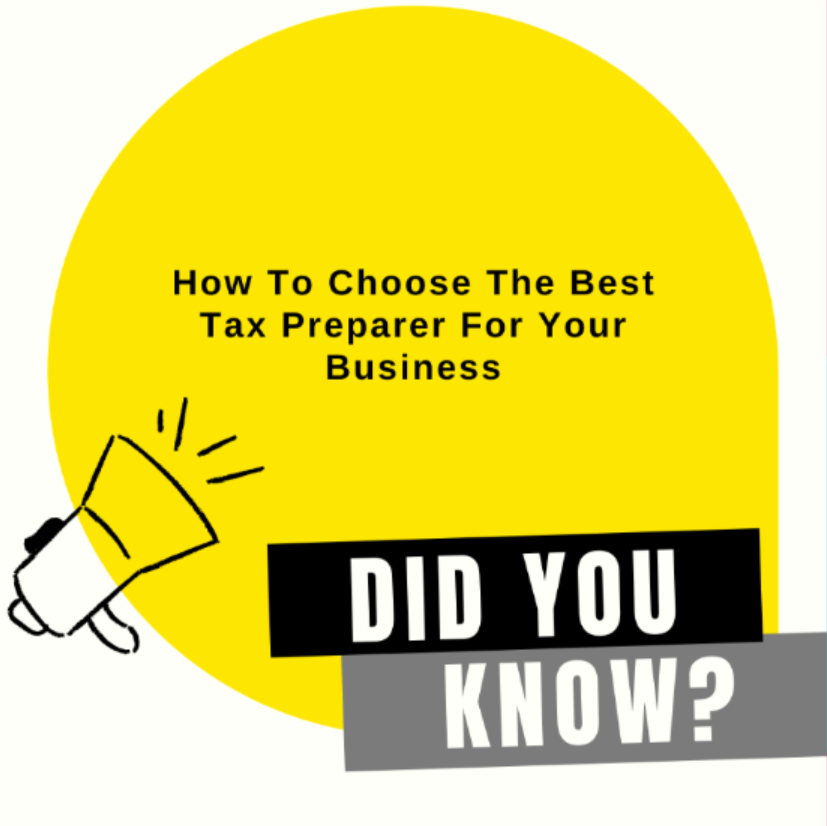How To Choose The Best Tax Preparer For Your Business
Many times new business owners try to do everything themselves because they are lacking funds or want to save money. Although this definitely isn’t the best strategy for business growth, you can probably still relate to this. You want to preserve the limited funds you have so you can keep your business running. You know you’re capable and smart, so why shouldn’t you handle as many of these operational tasks as you can? (Even though we know that this just spreads us too thin.)
When it comes to preparing your business tax returns, though, it’s generally best to hire someone who knows what they are doing. Tax preparation is a specialized discipline, and there are people who make it a point to study the tax code and stay abreast of all changes. Most of us don’t do this, so hiring someone who knows the ins and outs of taxes can spare us lots of heartache and money.
As a business owner, you have a million different responsibilities to juggle every day. Let a qualified tax professional stay up on any new tax rules (and exceptions to rules, milestone/threshold modifications, exclusions, etc.,) so you don’t have to. Your time is better spent doing other things (namely, running your business!)
What Should You Look For In A Tax Preparer?
Deciding to have someone else handle your taxes is the first step. The second step is figuring out who to hire to do this. There are so many options out there. After all, everyone knows someone who does taxes, right? And we see those tax prep commercials constantly.
So, how do you know who to pick?
Choose someone who is experienced in your industry. This is key because then they won’t have to spend valuable (and expensive) time researching the intricacies of your field. They will already be familiar with the tax rules, etc. that are related to your business.
Choose someone who will be accessible and responsive to you. While this can be a bit tricky to figure out in advance, it’s of high importance. Try to find someone who works with a team so there are multiple people who can help you if a question arises. In addition, talk to people you know and request referrals. Specifically ask them how responsive their tax preparer is and take this under consideration when making your decision.
Choose someone who has a PTIN or CPA license (and uses professional tax software). There are a lot of people out there who moonlight, pretending to be you when they file your taxes (this is how they avoid investing in professional tax software). A tax preparer who has a PTIN that has been assigned to them by the IRS (or has a CPA designation) and who uses known tax software to prepare your returns is more apt to be a professional and not a fly-by-night individual who will ultimately disappear on you. (Per the IRS, “Anyone who prepares or assists in preparing federal tax returns for compensation must have a valid PTIN before preparing returns.”)
In addition to the above criteria, it is advisable to choose a tax preparer who you genuinely like. Then you’ll be more apt to have the type of relationship with them where you feel comfortable calling and asking questions. This will also help ensure that you receive a high level of support in case of an audit or tax issue.
Who Should You Avoid?
One of the most important things to remember is that you should avoid working with seasonal tax preparers who only “do taxes” during tax season. This is the type of individual who likely won’t be around if you get audited or have questions down the road. When it comes to your business in particular, you’ll want to work with a tax preparer who will respond to any audit notices you receive and who will be there if you ever have any questions.
A Final Word From Tuesday Brooks Owner of AJOY
So many of us want to save as much money as we can by doing as much as we can for our business by ourselves. It is natural and normal to feel this way. But when it comes to taxes — researching, preparing, and filing them — it’s best to let a professional manage them for your business. While this may be an added upfront cost, you’ll save so much time and money in the long-term by utilizing a CPA or PTIN-certified individual’s tax expertise, know-how, and experience.


